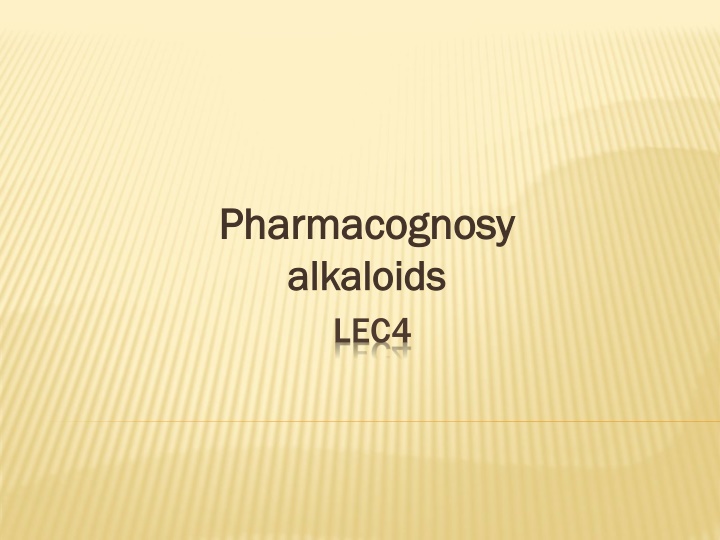
Alkaloids: Types, Biosynthesis, and Medicinal Importance
Explore the world of alkaloids, with a focus on indole alkaloids, ergot alkaloids, and their derivatives such as ergotamine and psilocybin. Learn about their biosynthesis, medicinal uses, and potential side effects. Discover the role of alkaloids in pharmacognosy and their impact on neurological disorders like Parkinson's disease.
Download Presentation

Please find below an Image/Link to download the presentation.
The content on the website is provided AS IS for your information and personal use only. It may not be sold, licensed, or shared on other websites without obtaining consent from the author. If you encounter any issues during the download, it is possible that the publisher has removed the file from their server.
You are allowed to download the files provided on this website for personal or commercial use, subject to the condition that they are used lawfully. All files are the property of their respective owners.
The content on the website is provided AS IS for your information and personal use only. It may not be sold, licensed, or shared on other websites without obtaining consent from the author.
E N D
Presentation Transcript
Pharmacognosy Pharmacognosy alkaloids alkaloids LEC4
INDOLE ALKALODS a class of alkaloid containing a structural moiety of indole; many indole alkaloids also include isoprene groups and are thus called terpene indole or secologanin tryptamine alkaloids. it is one of the largest classes of alkaloids. Many of them possess significant physiological activity and some of them are used in medicine.
ERGOTAMINE Is used to relief migraine and is still used today It reduces vasodilatation , side effects include gangrene
The ergot alkaloid were used as a template for the semi-synthetic of bromocriptine, pergolide and cabergolide, which have use in neurological disorder such as Parkinson s disease. Ergot can cause hallucination and the hallucinogenic drug of abuse LSD(lysergic acid diethylamide) is structurally relatted to them. LSD
PSILOCYBIN Mushrooms of the genera Psilocybe, Panaeolus, Conocybe and Stropharia are known to produce psychoactive substance such as psilocybin, which is salt in the fungi and is converted into psilocin in vivo.





















